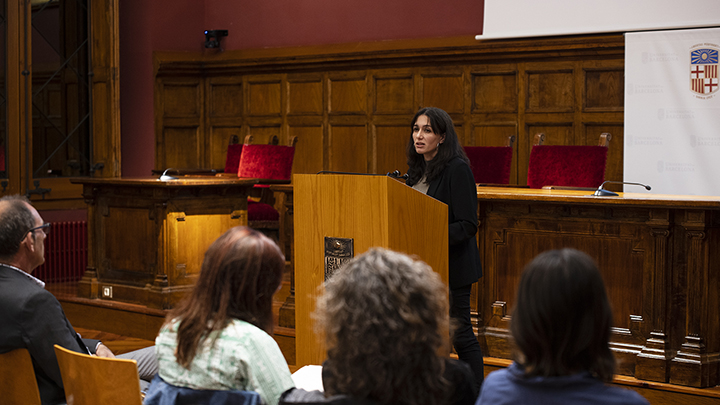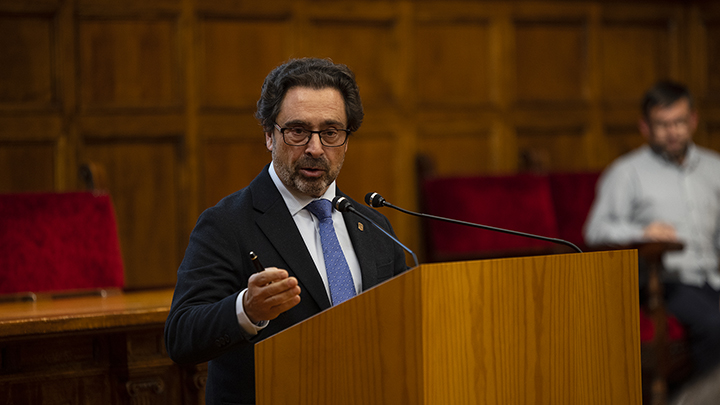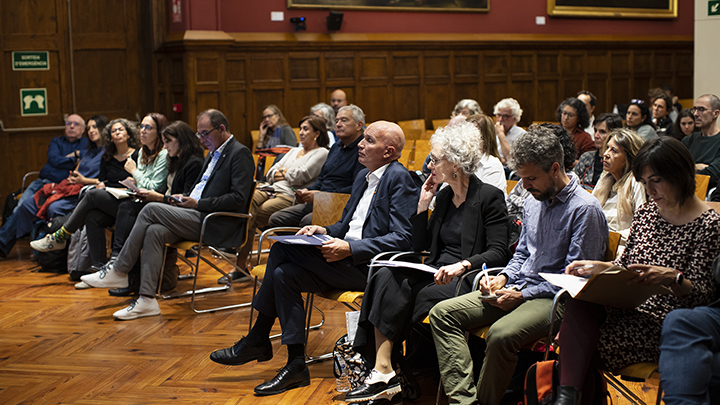UB’s FARO observatory to work on the improvement of the food system and a fair planet

News
|
Research
|
Divulgation
(31/10/2023)
Given the worrying context on the social and climate emergency, the University of Barcelona presented yesterday, at the Aula Magna of the Historic Building, the Food Action and Research Observatory (FARO). It will work on food in a systemic way — from production to consumption — as well as on problems such as climate change or malnutrition, among other issues.

News
|
Research
|
Divulgation
31/10/2023
Given the worrying context on the social and climate emergency, the University of Barcelona presented yesterday, at the Aula Magna of the Historic Building, the Food Action and Research Observatory (FARO). It will work on food in a systemic way — from production to consumption — as well as on problems such as climate change or malnutrition, among other issues.
Ana Moragues Faus, FARO promoter, started the talks to explain the main aims and work lines of this initiative and noted that food is related to the current environmental and social urgencies. “Food is at the core of the current big challenges”, she said. Then, Raquel Díaz, director of the Fundació Espigoladors, claimed the action towards the food ecosystem problems, and said that “we need applied research” urgently. Afterwards, Ana Bocio, deputy director of Health Promotion at the Catalan Government, said that food is related to diseases such as childhood obesity, and highlighted the importance of “social decisions” regarding health and nutrition.
Action research
Álvaro Porro, operations manager of Strategy of Social Economy - Barcelona Activa, noted that administrations need an “action research” that aims to influence society, and he gave FARO as an example. Isabel Peña-Rey, executive director of the Spanish Agency for Food Safety and Nutrition of the Ministry of Consumer Affairs, noted that the policies they promote are “based on science”. In these lines, she said that during the last years, the Agency has been oriented to a holistic view of food, including nutritional themes and environmental aspects.
Another expert that participated was Corinna Hawkes, director of the Food Systems and Food Safety Division, Food and Agriculture Organization of the United Nations (FAO), who talked about the importance of interdisciplinarity to address the theme of food. In this sense, she welcomed an initiative such as the FARO observatory: "There is a need for a connector, a research centre, between the different disciplines".
David Mascort Subiranas, Catalan Minister for Climate Action, Food and the Rural Agenda, explained that managing the world of food often means confronting positions. "At the University, you will help us to shed light on this problem, one of the main problems we have in the world", he said. Finally, the rector of the University of Barcelona, Joan Guàrdia, concluded that, once established, FARO has the challenge of "building a reality based on science". The Rector gave the observatory as an example of the University's work of "providing answers through research and transfer". "This makes us better as a university and as a country", he said.
The FARO team is made up of 36 people from seven faculties and ten departments at the UB. They work together to address some of the biggest challenges of the 21st century: that all people can feed themselves with dignity, generating health and well-being, prosperity, social justice and caring for and regenerating damaged ecosystems. The current food system — our way of producing, transforming, distributing, cooking, selling, consuming and wasting food — creates diseases, social inequality and degrades the ecological basis of the planet on which life is sustained. The new observatory will work to ensure that future generations can feed themselves in a healthy and sustainable way.
Action research
Álvaro Porro, operations manager of Strategy of Social Economy - Barcelona Activa, noted that administrations need an “action research” that aims to influence society, and he gave FARO as an example. Isabel Peña-Rey, executive director of the Spanish Agency for Food Safety and Nutrition of the Ministry of Consumer Affairs, noted that the policies they promote are “based on science”. In these lines, she said that during the last years, the Agency has been oriented to a holistic view of food, including nutritional themes and environmental aspects.
Another expert that participated was Corinna Hawkes, director of the Food Systems and Food Safety Division, Food and Agriculture Organization of the United Nations (FAO), who talked about the importance of interdisciplinarity to address the theme of food. In this sense, she welcomed an initiative such as the FARO observatory: "There is a need for a connector, a research centre, between the different disciplines".
David Mascort Subiranas, Catalan Minister for Climate Action, Food and the Rural Agenda, explained that managing the world of food often means confronting positions. "At the University, you will help us to shed light on this problem, one of the main problems we have in the world", he said. Finally, the rector of the University of Barcelona, Joan Guàrdia, concluded that, once established, FARO has the challenge of "building a reality based on science". The Rector gave the observatory as an example of the University's work of "providing answers through research and transfer". "This makes us better as a university and as a country", he said.
The FARO team is made up of 36 people from seven faculties and ten departments at the UB. They work together to address some of the biggest challenges of the 21st century: that all people can feed themselves with dignity, generating health and well-being, prosperity, social justice and caring for and regenerating damaged ecosystems. The current food system — our way of producing, transforming, distributing, cooking, selling, consuming and wasting food — creates diseases, social inequality and degrades the ecological basis of the planet on which life is sustained. The new observatory will work to ensure that future generations can feed themselves in a healthy and sustainable way.
Multimedia gallery


